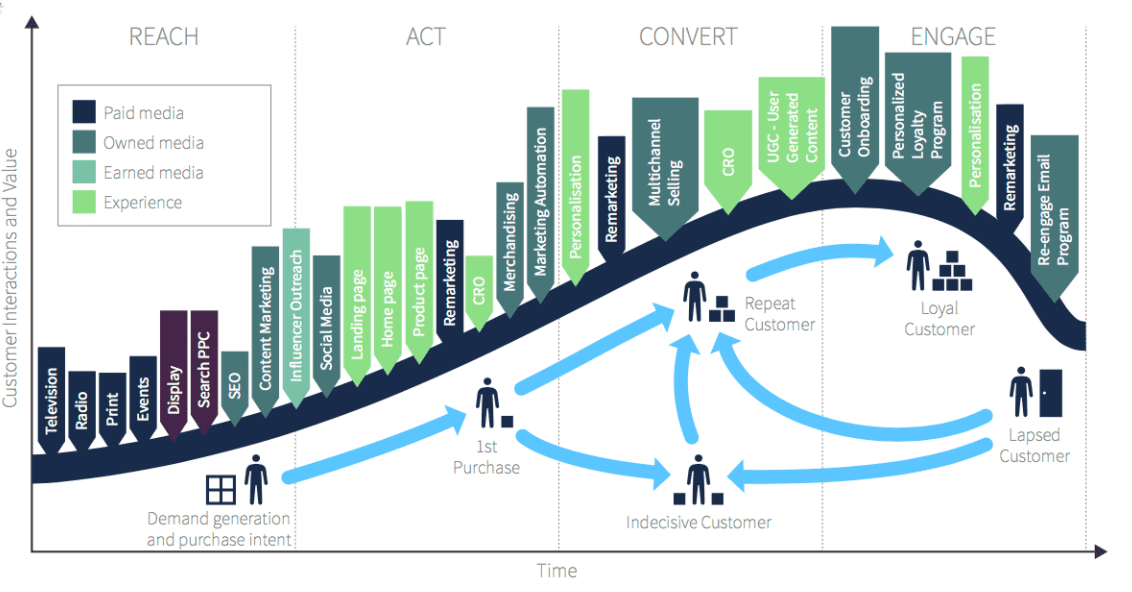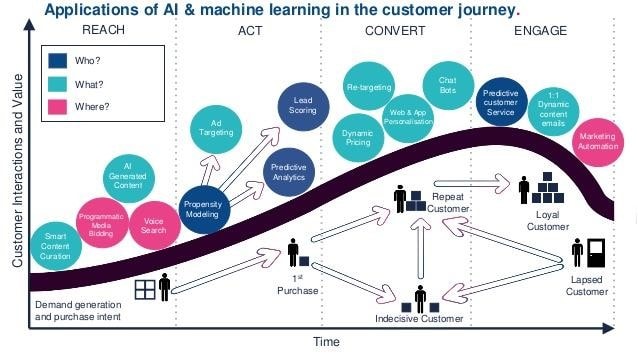Google Analytics the ULITIMATE GAME CHANGER, Why??
Let's face it, even in the current data-driven marketing environment, Analytics is the son of a red-haired man in internet marketing.
Optimizing your campaigns, content, and conversion rates creates a lot of excitement and attention, while analytics take a back seat. It does exist, but - even if it is set up correctly - most marketers only use it to check traffic statistics.
There are many reasons why analyzes get the short end of a stick. Analytics is not magical or exciting. Technically nothing produced.
Analytics are just statistics and most marketers don't careers because they like college statistics, right?
Unfortunately, 97% of Bowl's marketing campaigns fail without good analytical analysis.
At first glance, these statistics may seem crazy, but take a look at HubSpot's internal status report. If you use mathematics intensively instead of internal marketing, it becomes clear that - if you want to be successful in internet marketing - you need robust analyzes.
I hope to give you the idea that analytics are critical to your marketing success.
The question is why analytics are so important and how I can really use my analytics data to deliver profitable results to my company.
Why analyzes are important
Good analysis enables you to make decisions based on facts. Well on site, without analysis, you don't work with the attack - that's 97% of the time.Having Google Analytics is not enough. Understand what your data tells you and how your site statistics translate into business decisions.
However, if you don't know how to use your data effectively, you can get rid of the gut feeling ...
With that in mind, there are three ways you can use analytics statistics to improve your business.
Traffic
Traffic-based metrics give you valuable insights into your marketing attractiveness. For example, if you're running an overall CPC campaign, clickthrough rate or cost per click will determine the type of ad or ad copy that suits your audience. I can be very helpful.
In fact, AdWords provides numerous traffic statistics that provide you with a lot of useful information about how your target audience interacts with your ads, e.g. B. the word performance and the device distribution. Share the impression.
Likewise, most social media platforms offer a range of useful analytics to help you find out who is responding to your content. For example, websites, demographics, and areas of interest from Twitter ads can help you determine the type of people who click on your ads.
Most importantly, though, you're looking for your website's analytics data. Analytics services like Google Analytics or Chemometrics offer you many possibilities to determine where your traffic comes from, who it is (interests, demographic data, etc.) and how it connects to your website.
What your traffic tells you
Understanding your traffic is key to understanding the success or failure of some aspects of marketing.
For example, you say that you are a partner in a law firm and make a profit of $ 3500 per newly paid Graham with an average profit margin of $ 50.
Your data for the first five campaigns looks like this:
Based on these results, Campaign 3 appears to be the clear winner. It has the most clicks, best clickthrough rate (CTR) and lowest cost per click (CPC).
Campaign 4, on the other hand, is the most expensive click.
However, companies don't make money with clicks. Traffic helps you understand who is responding to your ads, but doesn't tell you how they respond to your website.
To get this information, you need to know if your traffic is really changing.
Conversions
Conversion metrics show you whether your website meets your traffic requirements. This data helps answer two very different questions.1. Does your website work with your potential customers?
If a large percentage of your traffic changes (buying your product, submitting a lead form, etc.), your landing page and / or website will meet your traffic expectations and needs.
If your traffic is not changing well, it may mean that something on your landing page / website is not working with your traffic. There could be attractive elements, many options or very long content or forms ... and the list goes on.
Addressing these issues is the key to improving Conversion Rate (CRO). If you have a lot of traffic and don't know why it hasn't changed, change or remove some elements of the website! The results can surprise you.
2. Do you have the right to exist?
As a marketer, we tend to think that when our traffic changes, an error should occur on our website. Our ads transport people to our website. So the fault of the website should be that it doesn't change, right?
Unfortunately, the truth is: The wrong traffic will never change, no matter how good your website is.
So if you're not happy with your conversion metric, it's often important to take a look at your traffic first. Are there certain sources of traffic that are changing dramatically? Are certain types of traffic (demographics, interests, etc.) changing better than others?
If you drive a lot of traffic that changes a lot (especially if you pay for that traffic), one of the easiest ways to improve your conversion rate is to drive traffic to your website. Do better.
3. What conversion metrics tell you?
In the case of cynicism from our law firm, let's look at your conversion data:Despite a relatively low conversion rate (CR), Campaign 3 is still behind everyone. In this case, the CPC was lower to overcome the impact of a lower conversion rate.
Campaign 4 continued in the final, however. Between its conversion rate and the high CPC, it generates up to 9 times the cost of project 3 leads.
Since Campaign 3’s conversion rate is half that of Campaign 1’s conversion rate, Campaign 3 may have performed better. Much of your traffic may not be related to this website, or the campaign may point to a landing page that may have changed a lot.
In both cases, the conversion data show that there is room for improvement.
Set up conversion tracking
Unlike traffic, setting up conversion tracking requires more workflow. However, the rewards are much more than the minimum effort required to prepare things.For conversion platforms like Google AdWords, Bing Ads, Facebook or Twitter, web conversion tracking is simple enough (click on the link for a description of how to set up conversion tracking).
However, phone calls can be a little more difficult. Google has an integrated solution for AdWords advertisers (click here to learn how to set them up). However, you need to find a call tracking platform.
In my experience, only 25% of companies have room to track calls, even when phone calls are the main source of their web shows! So if you're looking for a way to move ahead in the competition, call tracking is a good place to start.
However, the price of the call varies from company to company. Therefore, you want to measure the different company threads (calls, forms, chats, etc.) based on the value of your company.
Overall, conversion tracking is a great, relatively easy way to get the most out of your campaigns. If you haven't done so already, stop reading this article and get the conversion tracking spot!
Enough said
sale
Regarding traffic and conversion data, nobody answers the most important advertising question: "Are my campaigns profitable?" Here comes a good CRM role (Sales Force, Nimble, Zhuo, etc.).
The ultimate goal of any marketing campaign is to generate revenue for the company. In other words, if you really understand the effectiveness of your marketing campaigns, you need to track all sales, keywords, and other campaign metrics based on their sales.
Let's take a look at the law firm and see how their sales data is protected:
When you look at this information, it suddenly becomes clear which campaign is the most beneficial for the company.
Our successful campaign to measure traffic and conversions consists of 3 worst in class (SR) and the highest cost-per-sales (CPS).
And most importantly, closing it off eliminates half of sales and the return on investment (ROI) for this campaign is only 92% - which loses money on the campaign.
Campaign 4, on the other hand, seems to be the biggest loser, in fact it is the most profitable campaign.
Traffic in Campaign 4 may be less than Traffic in Cell 3 compared to Traffic in Cell 3, which is why the CPC (and average number of clicks) were lower. Campaign 4 may filter leads on a traffic landing page better, resulting in a lower conversion rate.
Regardless of the specific reasons why Campaign 4 was profitable, this scenario is not uncommon. I have seen that all of these results should be repeated for companies across all industries.
Unfortunately, most companies do not bother to know their advertising effectiveness in their sales figures. As a result, they spend a large part of their marketing budget on campaigns that lead to bottom-level results.
This is the high price of ignorance.
Do you need additional work to set up and manage CRM? Yes, but knowing which campaigns are really important to your business is worth the time and cost. The discoveries you make can change the way you market your business.
Finally
Which marketers what you don't know can harm you. Ignorance is not a joy - it is a guarantee near a campaign failure.
If you want a 5% chance of success, you need to understand how traffic, conversions, and sales affect your business and improve the effectiveness and profitability of your marketing campaigns. How to use it Use your analytics properly and see your campaigns start!
I have heard my year and now I want to hear from you. Do you agree with this opinion? Traffic How can you use traffic, conversion, and / or sales data to improve campaign performance?



































No comments:
Post a Comment